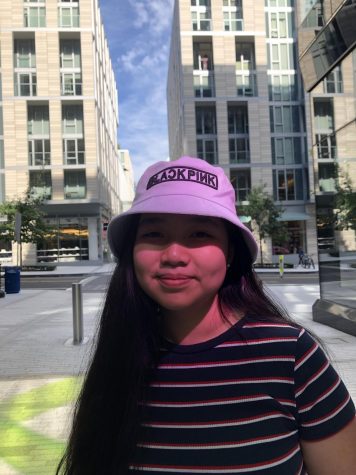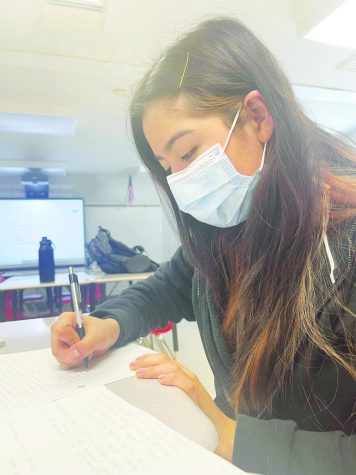AHS speak up for the Uyghurs
The blue mask is worn during protests against the Uyghur concentration camps. It symbolizes how China is silencing the Uyghurs.
History repeats itself as another genocide is happening in the world today.
Millions of Uyghur Muslims are currently being imprisoned in hundreds of camps located in Xinjiang, China. The Uyghurs make up the majority of the camp detainees, however, there are also other Muslim minority groups held in these camps.
The Chinese government initially denied the existence of these camps, but later acknowledged them as “re-education centers” or “vocational training centers’’ for the Muslims.
These camps are part of the measures the government believes are necessary to prevent religious extremism and terrorism.
The Uyghurs in these camps are held against their will and forced to participate in unspeakable things.
“I think that the way Uyghurs are being treated in these camps are extremely inhumane and wrong,” junior Ishat Hannan said.
The Uyghurs detained in the camp are being subjected to rape, forced labor, organ harvesting, and even death. They are also forced to eat pork and drink alcohol, which are against their religions.
“It’s truly sickening,” junior Kenneth Anderson said. “These practices are inhumane, and it’s disappointing to see such actions take place in the current world.”
“In many other historical genocides you see the same treatment that the Uyghur Muslims are now experiencing which is beyond awful if not more,” Coulter said.
What’s happening to the Uyghurs upsets many people around the world, including many students at AHS, as it’s a complete violation of human rights.
“This is a human rights issue and should be brought to the public’s attention more often,” Anderson said.
The Uyghur camps also remind some of what happened to the Jewish in Germany in the past.
“This genocide is like the Holocaust of the 21st century,” Hannan said.
Numerous students are educating themselves on this issue to help spread awareness.
“I personally like to read about the genocide to further educate myself on the current event so I can have conversations with my friends and family about what is happening and how we can help,” Coulter said.
Some students have taken it upon themselves to do what is in their power to help.
“I try my best to spread awareness by talking to my friends and family about the issue and donating when I can,” Anderson said.
Students have also reposted posts relating to the issue on their Instagram stories, Snapchat, or other social media forms.
In order to help make progress in stopping this genocide, it’s important to get a lot of attention in order to gain as much support as possible to show that people want change.
A lot of students have noticed that there isn’t as much media coverage as there should be for a problem this dire.
“Considering that not many people are talking about this genocide and or taking action shows that the media is not covering this topic enough,” Hannan said.
“I think some media outlets have covered it with an a story or two which is definitely not enough and within these articles they refer to it as if it’s not a genocide which is incorrect,” Coulter said.
This issue also isn’t discussed a lot about in many classes at school, even though it is an important event.
“I have not heard one class talk about the current genocide that is happening. I think a part of not talking about it in class because a lot of people are unaware of this genocide,” Coulter said. “I think it should be talked about in school. We learn about many genocides and the current one should be included.”
Anderson also agrees that this is an issue that should be covered in classes. “I think it’s important to teach students about this issue since it’s a tragic event taking place right now,” Anderson said.
So far President Biden has not taken any action towards the situation. However, he has shown great support for the Uyghurs by acknowledging that what’s happening is a genocide and planning to take action to stop it. Recently, President Biden has also expressed his concerns to Chinese President Xi Jinping over the phone.
“I trust that Biden will take more action against the current genocide than our former president would have,” Anderson said. “It is possible that some change may come, but as long as countries remain dependent on China for trade, I doubt that such change will come extremely soon.”

Senior Uyen Huynh is in her third year on staff at The A-Blast. She is currently one of the In-Depth Editors. She has previously been the International...











